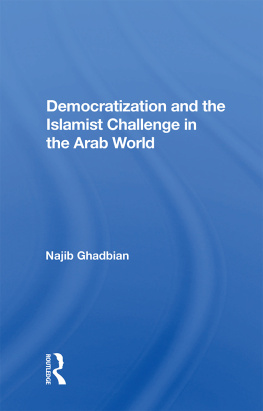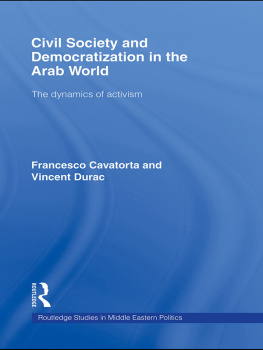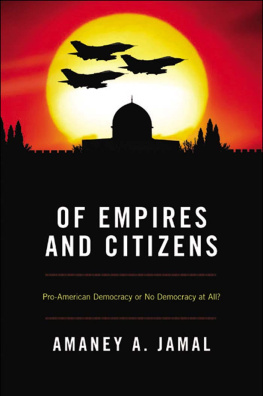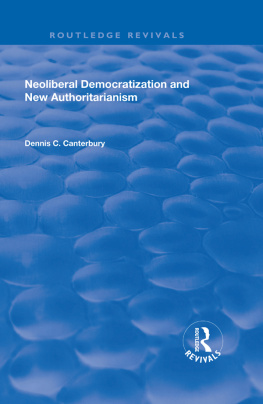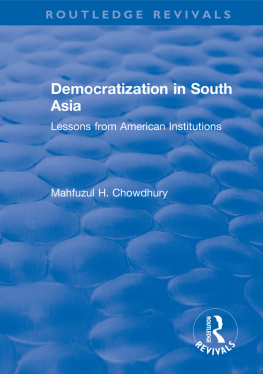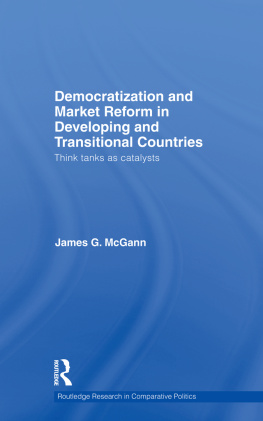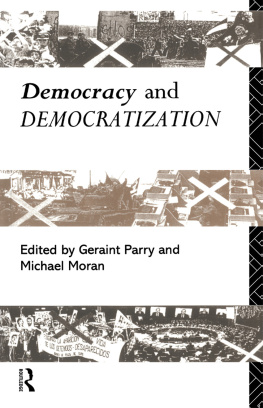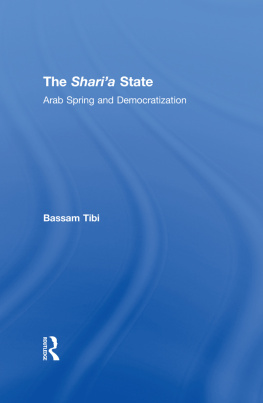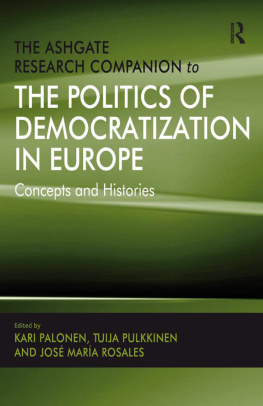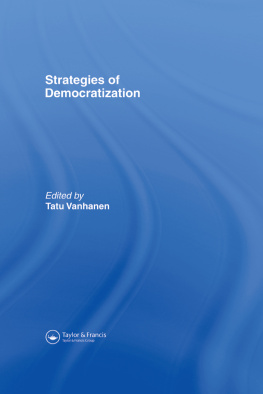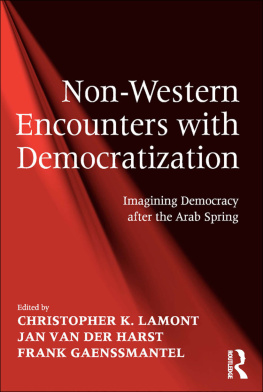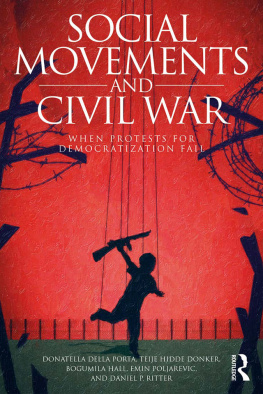Democratization and the Islamist Challenge in the Arab World
State, Culture, and Society in Arab North Africa
Series Editors
John P. Entelis, Fordham University
Michael Suleiman, Kansas State University
The states and societies of Arab North Africa have long been neglected in the scholarly literature dealing with the Arab world, the Middle East, and Islam, except in the context of dramatic international events. Yet this region has a rich historical and cultural tradition that offers important insights into the evolution of society, the complexity of cultural life, forms of social interaction, strategies of economic development, and patterns of state formation throughout the developing world. In addition, as the region has assumed more importance in geopolitical terms, both the United States and Europe have become more directly involved in its economics and politics. Few books of a scholarly or policy nature, how-ever, analyze and interpret recent trends and changes in the constellation of relations between regional and global powers. This new seriesthe first in English to focus exclusively on North Africawill address important conceptual and policy issues from an interdisciplinary perspective, giving special emphasis to questions of political culture and political economy.
Books in This Series
Democratization and the Islamist Challenge in the Arab World, Najib Ghadbian
Political Ascent: Contemporary Islamic Movements in North Africa, Emad Eldin Shahin
The North African Environment at Risk, edited by Will D. Swearingen and Abdellatif Bencherifa
Polity and Society in Contemporary North Africa, edited by I. William Zartman and William Mark Habeeb
Democratization and the Islamist Challenge in the Arab World
Najib Ghadbian
First published 1997 by Westview Press
Published 2018 by Routledge
52 Vanderbilt Avenue, New York, NY 10017
2 Park Square, Milton Park, Abingdon, Oxon OX14 4RN
Routledge is an imprint of the Taylor & Francis Group, an informa business
Copyright 1997 Taylor & Francis
All rights reserved. No part of this book may be reprinted or reproduced or utilised in any form or by any electronic, mechanical, or other means, now known or hereafter invented, including photocopying and recording, or in any information storage or retrieval system, without permission in writing from the publishers.
Notice:
Product or corporate names may be trademarks or registered trademarks, and are used only for identification and explanation without intent to infringe.
Typeset by Letra Libre
Library of Congress Cataloging-in-Publication Data
Ghadbian, Najib
Democratization and the Islamist challenge in the Arab world /
Najib Ghadbian.
p. cm. (State, culture, and society in Arab North Africa)
Includes bibliographical references and index.
ISBN 0-8133-2784-9
1. Islam and politicsArab countries. 2. Islam and stateArab
countries. 3. Arab countriespolitics and government1945
4. Islam20th century. I. Title. II. Series.
BP63.A4A7247 1997
320.917'4927'948dc21 97-411
CIP
ISBN 13: 978-0-367-01027-0 (hbk)
For my intellectual companion, Mohja
Serious democratization measures have occurred in the Arab world since the mid-1980s, particularly in Egypt, Jordan, Algeria, and Yemen. The rise of Islamic movements ("fundamentalism" or "political Islam") has coincided with this push toward democracy. Islamists have participated in and benefitted from the democratization process, especially in countries that allowed free elections (e.g., Jordan and Algeria). Why has democratization reached an impasse in the Arab world? What is the intersection of democratization with the rise of the Islamists? What are the prospects for democracy in the current contexts of the Arab world?
This work explores these questions in terms of identity struggle as manifested in the conflict between ruling elites, secularists, and their Islamist challengers. In contexts where the conflict over collective identity has subsided and some sort of tentative compromise, if not total agreement, about the role of Islam in the public domain has been achieved, the process of democratization has advanced. Countries whose governments have allowed Islamists limited participation, and in which Islamists have agreed to work within the system, are closer to democratization than countries whose governments have refused to recognize them at all and in which Islamists are correspondingly more radical. The decision to accommodate diversity procedurally is achieved best if it comes first from political leaders and proceeds gradually. Second, where the sides are sharply polarized over collective identity to the point of attempting change by violent means, the outcome is generally not democratic rule but another form of authoritarianism, whether in Islamist or secularist form. Third, democratization has not advanced in places where major local or international interests are most threatened by the rise of new forces, namely Islamists.
consists of two case studies, one of Egypt's coercion and containment of Islamists and the other of Jordan's milder experience with Islamists. I conclude by discussing the prospects for democracy in the Arab world.
For translation of Arabic words, I have used the simple system of the International Journal of Middle East Studies, with some modifications following those of Albert Hourani in A History of the Arab Peoples. Thus, the ` ayn is indicated by an inverted apostrophe (`') and the hamzah is indicated by an apostrophe (') only if they come in the middle of a word. Second, the definite article a-~ is prefixed to an Arabic name only the first time the name is used. Third, doubled vowels in the middle of a word are indicated by iyya or uwwa. Finally, words or names which have a familiar English transliteration are used in the familiar form, such as "Nasser" of Egypt rather than "Nasir," except that official spellings are used for "Makkah" and "Madinah."
Najib Ghadbian
New Brunswick, New Jersey
The writing of a book is never an individual work. So many people, including those listed here, have helped and have my earnest gratitude.
I would like to thank my professors at The Graduate School, CUNY: Dankwart Rustow, Ervand Abrahamian, Jacquilme Braveboy-Wagner, Kenneth P. Erickson, Howard Lentner, and W. Ofuatey-Kodjoe. I am grateful to my colleagues at The Graduate School who discussed these ideas with me. Professor John Entelis generously read the manuscript and urged me to seek publication. Laura Parsons, Barbara Ellington, and Patricia Heinicke at Westview have provided patient professional attention to the manuscript. Thanks to Jon Brooks and Andrew Davis at Letra Libre for typesetting.
I wish also to thank all those who granted me interviews in Jordan, Egypt, Sudan, Saudi Arabia, and the United States, and those who kindly helped me arrange the interviews.
I thank my friends who provided good-humor and computer-literate advice at key points.
My family has supported me in many ways throughout the writing. My parents, sisters, brothers, and in-laws encouraged and implored me to finish.
Most of all, I want to thank my wife, Mohja Kahf, for reading, responding, disagreeing, editing, reading again, and otherwise contributing lovingly to this work.

